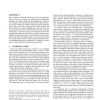Free Online Productivity Tools
i2Speak
i2Symbol
i2OCR
iTex2Img
iWeb2Print
iWeb2Shot
i2Type
iPdf2Split
iPdf2Merge
i2Bopomofo
i2Arabic
i2Style
i2Image
i2PDF
iLatex2Rtf
Sci2ools
210
click to vote
SIGMOD
2007
ACM
2007
ACM
P-ring: an efficient and robust P2P range index structure
Data availability, collection and storage have increased dramatically in recent years, raising new technological and algorithmic challenges for database design and data management. Moreover, the expansion of the Internet made possible the collaboration between large numbers of computers sharing data from around the globe. Peer-to-peer (P2P) systems provide a robust, scalable, and decentralized way to share and publish data. In such a system, the key question becomes: how to efficiently find the data one needs? In this paper, we propose P-Ring, a new P2P index structure that supports both equality and range queries, is fault-tolerant, provides logarithmic search performance even for highly skewed data distributions, and efficiently supports large sets of data items per peer. We experimentally evaluate P-Ring using both simulations and a real distributed deployment on PlanetLab. We compare its performance with Skip Graphs, Online Balancing and Chord.
Related Content
| Added | 08 Dec 2009 |
| Updated | 08 Dec 2009 |
| Type | Conference |
| Year | 2007 |
| Where | SIGMOD |
| Authors | Adina Crainiceanu, Prakash Linga, Ashwin Machanavajjhala, Johannes Gehrke, Jayavel Shanmugasundaram |
Comments (0)

